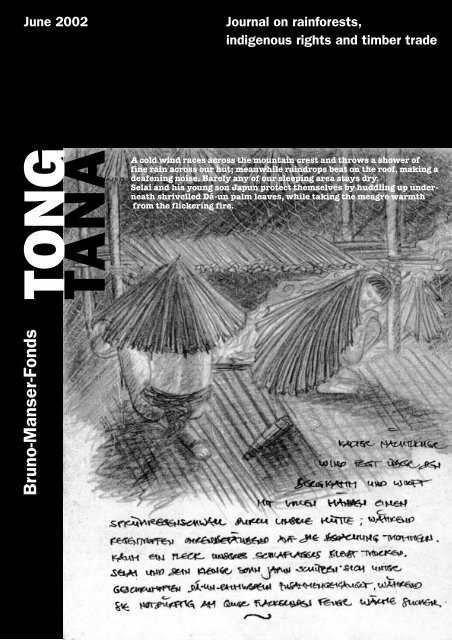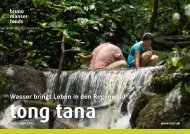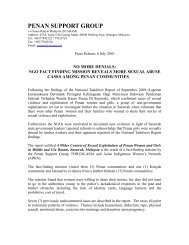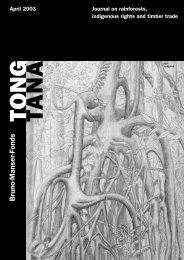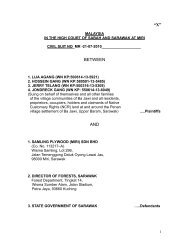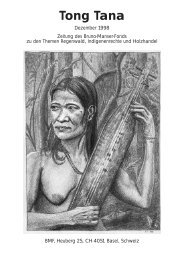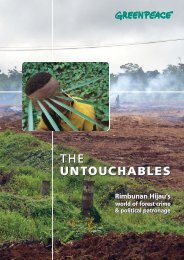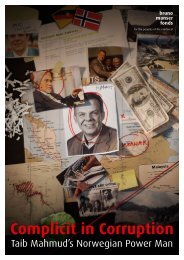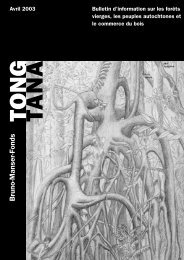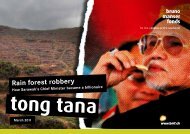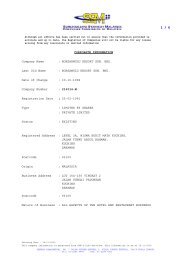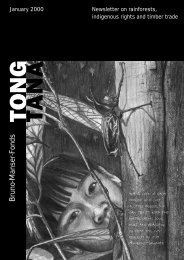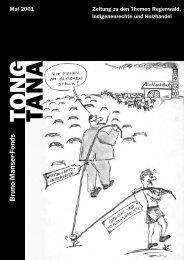Sara w ak-Mala ysia - Bruno Manser Fonds
Sara w ak-Mala ysia - Bruno Manser Fonds
Sara w ak-Mala ysia - Bruno Manser Fonds
You also want an ePaper? Increase the reach of your titles
YUMPU automatically turns print PDFs into web optimized ePapers that Google loves.
June 2002<br />
<strong>Bruno</strong>-<strong>Manser</strong>-<strong>Fonds</strong><br />
Journal on rainforests,<br />
indigenous rights and timber trade<br />
A cold wind races across the mountain crest and throws a shower of<br />
fine rain across our hut; meanwhile raindrops beat on the roof, m<strong>ak</strong>ing a<br />
deafening noise. Barely any of our sleeping area stays dry.<br />
Selai and his young son Japun protect themselves by huddling up underneath<br />
shrivelled Dá-un palm leaves, while t<strong>ak</strong>ing the meagre warmth<br />
from the flickering fire.
Editorial<br />
2 Tong Tana June 2002<br />
“Mankind is basically bad” is what I often used to hear<br />
20 years ago when I started to think about the world<br />
we live in. I was enraged by the inhumanity we are<br />
willing to accept, the calculating inhuman ways we<br />
are ready to apply, for fear of loosing our material<br />
happiness.<br />
Today it is said that the human being is a “self-interest<br />
optimiser”. All the scandalous social and environmental<br />
injustice happening daily has acquired, under the<br />
so innocent and harmless sounding label of “globalisation”,<br />
the status of a Law of Nature. At least, that’s<br />
what today’s leading authorities in economic and<br />
political sciences maintain. To prove this theory the<br />
“population explosion” is always held up in equation to<br />
the needs of our consumer society.<br />
Egoism and materialism are not Laws of Nature. As for<br />
example an anonymous official of the forest authorities<br />
of <strong>Sara</strong>w<strong>ak</strong> commented to the Tribune after he had<br />
been caught in a traffic jam caused by a landslide: “If<br />
the trees had not been cut down on the hilltop indiscriminately,<br />
the catastrophe could have been avoided.”<br />
In 1994 report on global soil-threat the Scientific Advisory<br />
Council to the Federal Government of Germany<br />
stated the following: “Soil constitutes an essential<br />
basis of life of the human being and has, up till now,<br />
been neglected. Many local processes accumulate to<br />
a global environmental trend against which political<br />
measures must urgently be t<strong>ak</strong>en.”<br />
The Advisory Council investigated twelve “illnesses of<br />
the soil” caused by mankind and named them after<br />
their geographical focus points. They coined the name<br />
“<strong>Sara</strong>w<strong>ak</strong> Syndrome” which now globally stands for<br />
the destruction/loss of soil through over-use of the<br />
forests.<br />
The International Tropical Timber Organisation ITTO<br />
came after its two missions to <strong>Sara</strong>w<strong>ak</strong> 1989 to the<br />
same conclusion and urged <strong>Sara</strong>w<strong>ak</strong> to drastically<br />
reduce the annual logging-quota – in vain.<br />
Both institutions support their findings with economical<br />
arguments: Natural resources are limited. Once<br />
plundered a source of income is lost while as a consequence,<br />
immense costs are generated.<br />
The tropical timber industries are aware of these matters<br />
and hold the industrialised countries responsible<br />
as these countries “are not willing to finance sustainable<br />
forest industries in the Tropics.” (<strong>Mala</strong><strong>ysia</strong>’s<br />
Premier Mahathir, The Star 15.3.02).<br />
16 people lost their lives in the mud slide in <strong>Sara</strong>w<strong>ak</strong>.<br />
Countless others lost all they owned. At the same time<br />
<strong>Sara</strong>w<strong>ak</strong>s timber industry announced that in the years<br />
2000 and 2001 they had exported products valued at<br />
3 billion US$.<br />
Thus the arguments in the globalisation gospel – from<br />
“poverty eradication” to “prosperity for all” – turn out<br />
to be the actual root of the problem.<br />
The believers in globalisation do grant the environmentalists<br />
an important position as public informants.<br />
The <strong>Sara</strong>w<strong>ak</strong> syndrome<br />
But when it becomes a matter of meeting the demands<br />
of a responsible and conscious society, then the<br />
political and economical establishment justifies its<br />
inactivity by referring to Laws of Nature “globalisation”<br />
and the “WTO” (World Trade Organisation).<br />
In Switzerland 90% of the population would welcome<br />
an import moratorium on wood from over-exploited<br />
tropical forests (BUWAL 1998), while in the EU 80%<br />
of the population hold the tropical timber industry<br />
responsible for the destruction of the rain forests<br />
(University of Vienna, Austria, 1998).<br />
As long as our politicians find themselves incapable of<br />
meeting the needs of the masses due to the aforementioned<br />
Laws of Nature, we stay co-responsible for<br />
the destruction of the basis of live per se.<br />
But the powerlessness against globalisation is the<br />
same everywhere – and causes us to feel greater solidarity<br />
for the Penan and other minority groups: Let us<br />
not allow the helplessness to be, like the injustice,<br />
also declared a Law of Nature!<br />
We need to bre<strong>ak</strong> out of the prison of fearful thought<br />
patterns, to call an end to this delusion of economic<br />
growth and productivity! We need alternatives to a<br />
meaning in life reduced solely to our personal profit!<br />
New and long-term social concepts are called for and<br />
people who have the courage to think in the scale of<br />
entire social concepts, to work for it and support it!<br />
The indigenous peoples with their integrating view of<br />
life, their sustainable use of nature’s resources and<br />
their intuitive abilities can be our models in this<br />
process!<br />
As the famous biologist Edward O. Wilson writes in his<br />
alarming book The Future of Life: “We need nature and<br />
particularly its wilderness strongholds. It is the alien<br />
world, that gave rise to our species, and the home to<br />
which we can safely return. It offers choices our spirit<br />
was designed to enjoy.”<br />
In this spirit we believe! With your support we will<br />
continue fighting for the future of life.<br />
John Künzli
<strong>Sara</strong>w<strong>ak</strong>-<strong>Mala</strong><strong>ysia</strong><br />
3 Tong Tana June 2002<br />
This blockade near Long Pengaran …<br />
The situation of the Penan<br />
jk – The biggest, still intact forest region of <strong>Sara</strong>w<strong>ak</strong> is<br />
around the headwaters of the River Baram. The Penan<br />
of this region have been semi-nomadic for decades:<br />
They do live in permanent houses and grow mountain<br />
rice but they still hunt and gather most of their food,<br />
medicine and building materials in the forest.<br />
In the late 1980s the Penan managed to put a halt to<br />
logging activities with repeated road blockades. This<br />
went on until 1993 when the most successful Penan<br />
blockade at Long Sebatu was smashed after 8 month<br />
in a massive police and military operation, and the<br />
village razed to the ground (little Sonny died because<br />
of the tear gas).<br />
The logging company Samling and the government of<br />
<strong>Sara</strong>w<strong>ak</strong> therefore looked for unconventional means to<br />
exploit this last big timber mine of <strong>Sara</strong>w<strong>ak</strong>: they promised<br />
the Penan to respect their needs and to use the<br />
forest with “care”. The German Agency for Technical<br />
Assistance (GTZ) offered their help and together with<br />
Samling and the forest authorities developed the<br />
FOMISS project (forest management system <strong>Sara</strong>w<strong>ak</strong>).<br />
Together the three project partners tried to get the Penan<br />
to agree. Even though FOMISS declared the Penan as<br />
equal partners in the project, their “involvement” was<br />
limited to a concluding acceptance. But the Penan<br />
didn’t let themselves be cheated – Samling and the government<br />
had already broken too many promises. That<br />
the GTZ made <strong>Bruno</strong> <strong>Manser</strong> responsible for the failure<br />
of the project, proves that the GTZ also does not regard<br />
the Penan as equal and independant partners.<br />
Last year the GTZ left <strong>Sara</strong>w<strong>ak</strong> again. It left behind a<br />
filthy rich and unscrupulous logging company with a<br />
forest management plan worth millions financed by<br />
German taxes – and refused the concerned Penan and<br />
NGOs inspection of records.<br />
Samling is starting to implement the FOMISS forest<br />
management plan<br />
In February workers of Samling came to survey the<br />
forest in the area of the settlements of Long Sepigen<br />
(approx. 30 families, 80 members) and Long Kerong<br />
(45/230). Already in 1997 the situation got out of control<br />
here when over 70 Penan tried to negotiate with<br />
the Samling workers. In a brutal military operation –<br />
(quote: “We are going to bombard Long Kerong!”) – 14<br />
persons were injured and 4 Penan arrested (Newsletter,<br />
April 1997). The four Penan were acquitted but no<br />
criminal charges were ever pursued against the paramilitaries.<br />
In March 2002 Samling forced entry into the forest of<br />
Long Lai (27/100). The Penan tried repeatedly to<br />
initiate talks with the managers of Samling and open<br />
up negotiations – hitherto without success.<br />
… was dismantled by the army on 8 th May.<br />
The Penan villages Long Benali (16/85) and Long Pengaran<br />
(4/30) are being subjected to the destruction of<br />
their environment by Interhill Co. Interhill Co. refers to<br />
the Kelabit of Long Lelleng who gave them logging permission.<br />
A Day<strong>ak</strong> court has now to solve the dispute<br />
between these two peoples. The Blockade set up by<br />
the Penan of Long Pengaran Iman on may 2 nd was<br />
forcefully dismantled by 3 military platoons on may<br />
8th. Interhill speeds up the work within the Penanterritory<br />
with 10 bulldozers!<br />
Waves of resistance<br />
There have been at least 6 further blockades since the<br />
27 th March in the catchment basin of both the Limbang<br />
and the Baram Rivers – there haven’t been that many<br />
there in the last 10 years! These blockades were<br />
started by the Penan of Long Sayan and Long Belok under<br />
the guidance of the experienced activist and chief<br />
Ajeng Kiew. For the last 18 months they have been<br />
repeatedly blockading the road of the logging company<br />
Interhill Sdn. Bhd. After the first three days an agreement<br />
was worked out but later withdrawn by the Penan<br />
because it did not satisfy their demands and the subsequent<br />
negotiations were unsuccessful. On 18 th April<br />
the Penan resumed the blockade. This dispute is still<br />
outstanding.<br />
The second blockade was erected on the River Patah –<br />
once again on a logging road belonging to Interhill and<br />
Rimbunan Hijau Co. The manager agreed to all the<br />
Penan’s demands and asked them to come to Marudi<br />
to sign a contract in the presence of the district<br />
authorities. But on the 2 nd April there was nobody from<br />
Interhill in Marudi. The Penan returned home and on<br />
the 18 th April renewed blockades. Currently 5 Penan<br />
settlements participate in them.<br />
Blockades since March 2002
<strong>Sara</strong>w<strong>ak</strong>-<strong>Mala</strong><strong>ysia</strong><br />
4 Tong Tana June 2002<br />
The nomadic Penan resist<br />
Unexpectedly on the 8 th April the nomadic Penan who<br />
live in the Magoh territory on the River Tutoh put up a<br />
blockade. This group of nomads is led by Guman<br />
Magut and is fighting against Woodman Co. This<br />
blockade was given up on 13 th April after Woodman Co.<br />
had pulled the lorries and heavy machinery out of the<br />
nomads’ forest. The nomads justifiably fear the company<br />
will return, because this repeatedly happened in<br />
the past. The Penan demand that <strong>Sara</strong>w<strong>ak</strong>’s government<br />
recognize their land rights.<br />
The forth blockade was erected on the Madihit River,<br />
on 10 th April, by the nomadic Penan of the Limbang<br />
region, where the Tamex Timber Co., a dauther of<br />
Samling as well as the Lee Ling Company, have been<br />
destroying the environment of the Penan of this region<br />
for decades. This blockade could be upheld until the<br />
end of April without further any incidents, even though<br />
the police tried to lift it on April 17 th .<br />
On 10 th April Along Sega’s group also blockaded the<br />
road of the company Lee Ling, which used to be called<br />
Limbang Trading Co. and belonged to the former Minister<br />
of Environment, James Wong. This blockade could<br />
be upheld until May 15 th inspite of the police threatening<br />
to use tear gas.<br />
The Kayan and the Kenyah also protest<br />
Beginning of April the blockade of the settlement Long<br />
Bemang on the River Apoh escalated when the manager<br />
of Rimbunan Hijau Co.’s timberyard ran amok.<br />
The indigenous people, true to the traditions of their<br />
forefathers, tied the nutcase up and brought him to<br />
their chief in their longhouse. As a result of this 32<br />
Penan and Kayan were arrested. In their defence the<br />
indigenous people explain that Rimbunan Hijau has<br />
been forcing entry and destroying their forest for<br />
decades without permission and that they had to immobilize<br />
this violent and insulting manager for his own<br />
and everyone elses protection. The court has not as<br />
yet started legal proceedings in this case. Those suspected<br />
of wrongful deprivation of personal liberty are<br />
still under arrest.<br />
Sources: press release SAM, 23.4.2002/News of<br />
the Penan by Ulu Baram/ The Star/Borneo Post,<br />
18./28.4.2002/www.surforever.com/sam (website<br />
Sahabah Alam <strong>Mala</strong><strong>ysia</strong>)/www.earthisland.org./borneo/(Borneo<br />
Project)<br />
Developed Poverty<br />
As usual, whenever the indigenous people of <strong>Sara</strong>w<strong>ak</strong><br />
defend themselves against the “improvements” of<br />
their living conditions ordered by the government, the<br />
establishment does not t<strong>ak</strong>e the problem seriously but<br />
accuses foreigners of using the poverty of the Penan<br />
to serve their own<br />
Thus the rumour goes round that a new “white rajah”,<br />
or even <strong>Bruno</strong> <strong>Manser</strong>, is behind the current wave of<br />
resistance. According to the government, the Penan<br />
have never had it as good as now.<br />
Senator Balan Seling, self-appointed Penan expert and<br />
the one responsible for the “development” of the<br />
Penan, announced in the <strong>Sara</strong>w<strong>ak</strong> Tribune on December<br />
27 th , 2001, that the Penan of the Tutoh River had<br />
banished <strong>Bruno</strong> <strong>Manser</strong> because they had come to realize<br />
that only the government could really help them.<br />
In January 2002 we received the following information<br />
from the Embassy of <strong>Mala</strong><strong>ysia</strong> on the current<br />
situation of the Penan:<br />
– The Penan have received more government aid<br />
than any other group of the Day<strong>ak</strong>.<br />
– The Penan are allowed to live and uphold their<br />
culture and their traditions.<br />
– The Penan can profit from globalisation and information<br />
technology.<br />
– The State Committee for Penan Affairs helps the<br />
settled Penan to improve their circumstances by<br />
putting schools and clinics at their disposal.<br />
– The state supplies bridges, water, rice mills, building<br />
material, etc.<br />
– Four Penan Centres were set up.<br />
– The governmental Penan Affair Fund invested<br />
15 million Ringgit (app. 4 Mio US$) in the last<br />
15 years to wipe out poverty amongst the Penan<br />
and to settle them.<br />
– The Penan today are aware that governmental<br />
support has helped improve their living standards<br />
immensely...<br />
The department of the Chief Minister of <strong>Sara</strong>w<strong>ak</strong><br />
points out that only actively cultivated land can be<br />
claimed by the indigenous people. The government has<br />
allowed the Penan to continue their traditional life-style<br />
Guman Megut and his group blockade the road of<br />
the Woodman Company; April 2002.
<strong>Sara</strong>w<strong>ak</strong>-<strong>Mala</strong><strong>ysia</strong><br />
5 Tong Tana June 2002<br />
in remote forest areas but, at the same time, “development<br />
activities detrimental to the environment quality”<br />
such as logging are also permitted. The government<br />
stresses that it will not protect any forest for<br />
the Penan. Instead, the Penan are to be prepared for<br />
a “better” future. There are plans to herd 12,000<br />
Penan together into one single settlement in the middle<br />
of an oil palm plantation where they would have to<br />
find work as cheap slaves for the global palm oil<br />
market.<br />
Source: Chief Minister Department <strong>Sara</strong>w<strong>ak</strong>, January<br />
2002<br />
The Penan were not always hungry,<br />
poor and sick<br />
jk – The Penan tell a totally different story about the<br />
governmental development aid. As the government<br />
only recognizes land rights for areas under active cultivation<br />
PRIOR to 1958 – the Penan were at that time<br />
still living a nomadic life as hunters and gatherers – the<br />
Penan are now the only indigenous people without any<br />
land right titles at all. This is why for the last 20 years<br />
they have been forced to defend their very basis of living<br />
with such desperate means. All the demands and<br />
petitions to recognize and protect their legitimate<br />
rights and land claims have been ignored by the<br />
government. All promises made by the government to<br />
protect the forest for the Penan have been broken.<br />
Spe<strong>ak</strong>ers at the blockades testify that the situation of<br />
the Penan has never been worse:<br />
Ajeng Kiew, 50, chairman of the Penan Association of<br />
<strong>Sara</strong>w<strong>ak</strong> and chief of the settlement Long Sayan on the<br />
Apoh River: “We asked the government to protect our<br />
communal forest. We asked for schools and hospitals.<br />
But they sent us logging companies instead. And now<br />
plantation companies are following. Where is all the<br />
money the government has invested in us? Why does<br />
nobody ever come and see that we are suffering?”<br />
Ayan Jelawing, 64, Long Beluk on the Apoh River:<br />
Apoh means sago in our language. We were the first<br />
humans in this area and the river is named by us. Our<br />
boundaries were respected until the logging companies<br />
came in the 1980s and said, that we had<br />
absolutely no rights!”<br />
Seman Ngang, 60, Long Kevok: “The Penan Centre is<br />
nothing really. The clinic has no medicine, doesn’t<br />
even have a telephone, no real road either. Where<br />
does the government’s money for us go?”<br />
Lolie Mirai, Long Leng on the Layun River: “There was<br />
talk about forest reserves for us Penan. Instead logging<br />
companies came. We have no experience in agriculture<br />
and nobody helps us.”<br />
Johnny Lalang, 37, Long Lunyim on the Pelutan River:<br />
“We are treated like we are stupid. They don’t respect<br />
us at all. Before the government brings us development<br />
it must show us respect. All we want is our<br />
forest!”<br />
Penan woman preparing wild sago. Hunger only<br />
arrived with with the loggers!<br />
Lep Selai, nomad of the Limbang River: “My wife died<br />
from drinking the water from the river. My relatives<br />
settled at the Baram River. But now they have left the<br />
settlement because too many were hungry. We do not<br />
eat domestic animals. We eat the wild animals of the<br />
forest, that is our tradition.”<br />
Nyagung Malin, nomad of the Pu<strong>ak</strong> River: “Life was<br />
easy before the logging companies came. Now we are<br />
hungry. Sometimes I think I would like to settle but I<br />
know nothing about agriculture. If you really want to<br />
bring us development then give us our forest! My<br />
forefathers had no longhouses but they survived!”<br />
Peng Megut, nomad of the Magoh River: “The government<br />
has given all the forests to the logging companies.<br />
But the forest is our supermarket. Where else<br />
can we find all we need? My brother has settled in Long<br />
Menging but things are no better for him. If we settle<br />
down then it would be a trade off for our forest!”<br />
Selai Sega, nomad of the Limbang River: “Please tell<br />
the chairman of the Penan Committee and Dr. Mahathir<br />
that our rivers are being poisoned and many of<br />
us are sick. Money is spent quickly but our land will go<br />
on nourishing us. This land is not created for the<br />
government – nor was it created by the government!”<br />
Source: Friends of the Earth <strong>Mala</strong><strong>ysia</strong> SAM, Utusan<br />
Konsumer May 2002<br />
Helping the Penan<br />
The government wants to settle the Penan in a big way.<br />
Their model is the controversial B<strong>ak</strong>un Dam Project<br />
where by now over 10,000 Day<strong>ak</strong> had to leave the<br />
area. They were dispossessed and settled in the artificial<br />
town of Asap. They endlessly complain about the<br />
miserable compensations for their losses, bad infrastructure,<br />
few possibilities to m<strong>ak</strong>e an income, etc.<br />
The Penan want to decide independently about their<br />
life and their future, as they have always done. They<br />
are fighting for recognition of their legitimate land and<br />
prescriptive rights and will not give up even though<br />
their complaints and their petitions have up to now<br />
been unsuccessful. With great personal commitment<br />
they will go on resisting peacefully against the<br />
destruction of their environment.<br />
The BMF supports the Penan financially during blockades,<br />
arrests and court cases. We support a co-ordination<br />
centre for the Penan and we assist the information<br />
flows smoothly in <strong>Sara</strong>w<strong>ak</strong> and internationally.
<strong>Sara</strong>w<strong>ak</strong>-<strong>Mala</strong><strong>ysia</strong><br />
It’s best, though, to support self-help. Since the mid<br />
1990s the Penan are documenting their land rights by<br />
mapping out their territories (“Community Mapping”).<br />
By naming the rivers, hills and places in their own language<br />
they can prove their presence in a particular<br />
area over a long period of time. The boundaries of their<br />
territories as well as graves and places of worship, old<br />
hunting shelters, etc are mapped out using also the<br />
aid of the modern satellite technology (GPS). Another<br />
map shows the economic value the forest has for the<br />
Penan: where they hunt, find sago palms, where they<br />
have planted fruit trees or where they gather rattan.<br />
Also documented are the past and current damages<br />
done by the logging companies.<br />
The whole community participates in this survey.<br />
Afterwards these boundaries have to be recognized by<br />
the neighbouring communities. It t<strong>ak</strong>es a lot of time<br />
and effort. As this is done by the Penan themselves it<br />
strengthens their self-esteem and their communal<br />
spirit. While this work is in progress the Penan become<br />
aware of their land and use rights. The maps give them<br />
something in their hands which proves without words<br />
or discussion their very existence and encourages<br />
them to independent action and resistance. The maps<br />
remain in the possession of the Penan and can be<br />
used during negotiations with the logging companies<br />
and the authorities. During court cases the maps can<br />
prove the legality of their demands and they will also<br />
be invaluable to future generations who have not grown<br />
up in the forests.<br />
Cartography is the key to success<br />
During the last couple of years the Penan have<br />
gathered data with the support of <strong>Mala</strong><strong>ysia</strong>n and<br />
foreign experts. Now this data has to be clarified and<br />
any loopholes discussed with and closed by lawyers.<br />
<strong>Bruno</strong>’s rucksack was almost as big as he was. In<br />
March 2000 there was no time to draw the bee-hive<br />
in this enormous strangler fig.<br />
To finish mapping 8 Penan settlements still this year<br />
additional funds are necessary for the education of<br />
further Penan, to buy technical apparatus or to be able<br />
to call in international experts. At the same time work<br />
should commence with the last nomadic Penan who<br />
most desperately need such documentation of their<br />
existence for their legal demands. The BMF is also<br />
looking for financial support from third parties for this<br />
very capital-intensive project.<br />
In May 2001 when the High Court of <strong>Sara</strong>w<strong>ak</strong> had, for<br />
the first time in history, ruled that the Iban of Rumah<br />
Nor were to be awarded a piece of primary forest and<br />
that the government had illegally issued licences the<br />
judge upheld the verdict with maps and other documents<br />
made independently by the Iban. The parliament<br />
then forbid mapping by non-authorised sruveryers, but<br />
the courts decide independently what proof is admissible.<br />
On the 21 st April 2002 the High Court of West-<br />
<strong>Mala</strong><strong>ysia</strong> also ruled for the indigenous people and<br />
awarded the Orang Asli (First Humans) a piece of forest<br />
and financial compensation for incurred damages<br />
(New Straits Times 21.4.2002). The Orang Asli had<br />
also made their own maps to document their demands.<br />
Further precedents from Canada and other<br />
countries whose law is based on the British Commonwealth<br />
Law, as is the case in <strong>Mala</strong><strong>ysia</strong>, prove that<br />
“Community-Mapping” really can lead to success.<br />
<strong>Bruno</strong> <strong>Manser</strong><br />
jk – On the 19 th December 2001 the <strong>Sara</strong>w<strong>ak</strong> Tribune<br />
wrote that the Police Chief of Marudi district had<br />
returned from the Adang region. He had been questioning<br />
Along Sega and other Penan on <strong>Bruno</strong>’s disappearance<br />
finding out only that the nomads had not<br />
seen <strong>Bruno</strong> since a long time and had no idea where<br />
he could be. Datuk Yusoff Jaafar, Chief of the police<br />
department of <strong>Sara</strong>w<strong>ak</strong>, announced that the investigations<br />
would continue although there was no proof that<br />
<strong>Bruno</strong> had died or even been murdered.<br />
Two days later it was announced through the press<br />
that the authorities of <strong>Sara</strong>w<strong>ak</strong> would be returning the<br />
things they had confiscated when, in 1986, <strong>Bruno</strong> had<br />
just barely managed to avoid getting arrested.<br />
End of April 2002 two boxes containing old salt, rice, a<br />
pair of John Lennon spectacles, medicine against<br />
malaria, a fishing net among others arrived in Switzerland.<br />
Unfortunately the diaries which <strong>Bruno</strong> had been<br />
trying for years to retrieve were not included.<br />
The <strong>Mala</strong><strong>ysia</strong>n authorities still don’t believe that <strong>Bruno</strong><br />
lost his life in <strong>Sara</strong>w<strong>ak</strong>. They doubt he ever entered the<br />
country and speculate on his still hiding in Kalimantan,<br />
the Indonesian part of Borneo.<br />
That would be wonderful but, unfortunately, hardly<br />
realistic. The current resistance in <strong>Sara</strong>w<strong>ak</strong> proves, at<br />
least, that <strong>Bruno</strong>’s actions were not in vain. <strong>Bruno</strong>’s<br />
spirit lives on in the Penan’s fight for survival and<br />
helps us to deal with the uncertainty of his fate.
<strong>Sara</strong>w<strong>ak</strong>-<strong>Mala</strong><strong>ysia</strong><br />
7 Tong Tana June 2002<br />
NGOs withdraw from <strong>Mala</strong><strong>ysia</strong>n<br />
Timber Certification Council<br />
Process ignores concerns of forest peoples<br />
A coalition of <strong>Mala</strong><strong>ysia</strong>n based indigenous, non-governmental<br />
and community organisations have voiced<br />
strong concerns and objections to the <strong>Mala</strong><strong>ysia</strong>n<br />
Timber Certification Council (MTCC) over the ongoing<br />
voluntary timber certification process.<br />
The MTCC has been involved in drawing up criteria and<br />
standards for certifying <strong>Mala</strong><strong>ysia</strong>n timber has being<br />
sustainably produced so as to gain acceptance to<br />
European and US markets where consumers are<br />
demanding such timber.<br />
In developing the “<strong>Mala</strong><strong>ysia</strong>n Criteria, Indicators, Activities<br />
and Standards of Performance for Forest Management<br />
Certification” (MC&I), the MTCC, which is set<br />
up with the support of the government, had involved<br />
some NGO and community participation.<br />
NGOs and community groups, including indigenous<br />
groups who were part of the consultation process have<br />
now withdrawn their involvement and wish to announce<br />
that they do not endorse the ongoing certification<br />
process. Below is an excerpt of their letter.<br />
The MTCC in proceeding with its voluntary certification<br />
scheme without adequately addressing<br />
the call of the communities and NGOs for a moratorium<br />
on further logging in primary forests areas<br />
and in areas where indigenous peoples are asserting<br />
their native rights to land, demonstrates the<br />
total lack of genuine concern of indigenous peoples<br />
rights and the basic principles of forest management.<br />
We found the process highly flawed as it does not<br />
protect and recognise the rights of indigenous peoples<br />
and local forest communities who depend on the<br />
forests for their sustenance.<br />
In the circumstances, we cannot support the certification<br />
of any timber with the MTCC standard as being<br />
“sustainably produced”.<br />
We had since 1999 been involved in the certification-process,<br />
because we were genuinely interested<br />
in achieving sustainable forest management in<br />
<strong>Mala</strong><strong>ysia</strong>.<br />
However, we have also clearly communicated to the<br />
MTCC about a number of fundamental issues throughout<br />
the process that needed to be addressed and resolved<br />
before any credible and effective certification<br />
scheme can be in place.<br />
The issues centred on the rights of indigenous peoples<br />
to customary lands and forests and livelihoods<br />
of the people who live in and around forests. We<br />
questioned the value of participating in a process,<br />
that is currently not meeting the requirements of<br />
either the International Tropical Timber Organisation<br />
(ITTO) nor the Forest Stewardship Council’s<br />
(FSC) procedures and principles for forest management.<br />
Lorry after lorry, the Penans are losing their living<br />
space to the international markets.<br />
Among the serious concerns that we had raised with<br />
the MTCC included:<br />
• The encroachment of Forest Management Units,<br />
Protected Areas and logging concessions into the<br />
community’s forest areas t<strong>ak</strong>es away or restricts<br />
the community’s ownership rights, user rights and<br />
access to resources. Many of these areas are still<br />
being disputed because they involve either part of<br />
the whole of lands and forests over which local<br />
communities have native customary rights and<br />
claims.<br />
• The concept and process of sustainable forest<br />
management and certification is difficult for many<br />
of the indigenous and local communities to understand,<br />
because of the technical terms and lack of<br />
full information in local languages. Further, the concept<br />
of Sustainable Forest Management (SFM) as<br />
enforced though legislation and forest management<br />
plans is different from communities who see<br />
SFM as a means to ensure the continuity of forest<br />
resources for food, medicines, other daily needs<br />
and inheritance for the future generations.<br />
• Indigenous peoples have particular rights to land<br />
and use of forestland, which is different from other<br />
forest users’. There must be due recognition and<br />
respect for indigenous values, knowledge and<br />
practice related to land and forest.<br />
• Involuntary relocation of villages in a Forest Management<br />
Unit results in the loss of ownership and<br />
user rights. Besides, governments and development<br />
agencies often m<strong>ak</strong>e decisions to move the<br />
communities without consulting them first, resulting<br />
in further impoverishment of the communities.<br />
• Participation of forest communities must not be<br />
limited to just a few appointed leaders of members<br />
of the community. The entire village must be informed,<br />
consulted and involved in decision-m<strong>ak</strong>ing<br />
processes in order to have meaningful participation<br />
before they give their informed consent to the<br />
planning or implementation of development on<br />
their land or forest areas.<br />
We had demanded that the process be participatory,<br />
consultative, open, transparent and involve representation<br />
of all key st<strong>ak</strong>eholder groups at all levels who<br />
have a genuine interest in forest management and<br />
conservation in <strong>Mala</strong><strong>ysia</strong>.<br />
We understand that the MTCC has been communicating<br />
with various bodies dealing with timber certification
<strong>Sara</strong>w<strong>ak</strong>-<strong>Mala</strong><strong>ysia</strong><br />
such as Keurhout Foundation (Netherlands), Initiative<br />
Tropenwald (Germany), Tropical Forest Trust (USA) and<br />
the FSC (international). Yet we do not know exactly<br />
what is the status of and relationship among different<br />
processes, and roles of MTCC therein.<br />
In relation to the forest management performance<br />
standards, we had insisted that the indigenous communities’<br />
legal and customary tenure or user rights<br />
(adat) be recognised.<br />
Land and forest disputes between the communities on<br />
the one hand, and the government, logging concessionaires<br />
and licensees on the other hand, are serious<br />
and continue to exist in the country. Violations of the<br />
rights of indigenous peoples continue and the timber<br />
certification process does not acknowledge such<br />
concerns.<br />
We have come to realise that our participation and<br />
involvement in the MTCC certification process have<br />
been misconstrued as giving consent and approval to<br />
the standards drawn up by the MTCC.<br />
The objections that we have raised several times to<br />
the MTCC have continuously been ignored and not<br />
resolved. We, therefore had not other choice but to<br />
withdraw our involvement from the MTCC process in<br />
July 2001.<br />
We deeply regret efforts by the timber industry in this<br />
country and the MTCC in proceeding to certify timber<br />
from <strong>Mala</strong><strong>ysia</strong> as being “sustainably produced” when<br />
the concerns of indigenous and local communities<br />
have not been t<strong>ak</strong>en into account and their rights<br />
ignored.<br />
… and the political-industrial complex t<strong>ak</strong>es shameless<br />
advantage of their powerlessness<br />
The needs and wishes of the Penan are ignored …<br />
1. Persatuan Orang Asli Semenanjung <strong>Mala</strong><strong>ysia</strong><br />
(POASM), Semenanjung <strong>Mala</strong><strong>ysia</strong><br />
2. Sinui Pai Nanek Sngik (SPNS), Per<strong>ak</strong><br />
3. Komuniti Orang Asli Daerah Slim River, Per<strong>ak</strong><br />
4. Center for Orang Asli Concerns (COAC), Selangor<br />
5. Partners of Community Organisations (PACOS<br />
Trust), Sabah<br />
6. KERUAN Association, <strong>Sara</strong>w<strong>ak</strong><br />
7. Borneo Resources Institute (BRIMAS), <strong>Sara</strong>w<strong>ak</strong>,<br />
http://brimas.www1.50megs.com/<br />
8. SILOP, <strong>Sara</strong>w<strong>ak</strong><br />
9. Indigenous Peoples’ Development Centre (IPDC),<br />
<strong>Sara</strong>w<strong>ak</strong><br />
10. Institute for Development and Alternative Living<br />
(IDEAL), <strong>Sara</strong>w<strong>ak</strong><br />
11. SACCESS, <strong>Sara</strong>w<strong>ak</strong><br />
12. Sahabah Alam <strong>Mala</strong><strong>ysia</strong> (SAM), <strong>Mala</strong><strong>ysia</strong>,<br />
http://surforever.com/sam/intro.html<br />
13. SOS Selangor (Save our Sungai Selangor),<br />
Selangor<br />
14. Suara R<strong>ak</strong>yat <strong>Mala</strong><strong>ysia</strong> (SUARAM), Selangor,<br />
http://www.suaram.org/home.htm<br />
Source: Press-release by the NGOs, February 2002
International<br />
9 Tong Tana June 2002<br />
The authors beneath one of the mightiest trees<br />
(with buttresses and thick lianas) in the Department<br />
of Madre de Dios, Peru (2002)<br />
Impressions from Peru<br />
We were in Puerto Maldonado, the capital of the Peruvian<br />
Departement Madre de Dios, in the lowlands of<br />
the Amazon. A colleague who knows the territory well<br />
assured us that no clearing was being done in this<br />
area. The rivers Tambopata and Madre de Dios meet in<br />
the area of this very industrious harbour. Mills work on<br />
the rice gathered from the small Chacras, cultivated<br />
fields, which lie along the river and are, therefore, easily<br />
accessible. Banana and maniok boats come into<br />
the harbour to feed a continuously growing town. Ten<br />
years ago Puerto Maldonado had a population of approximately<br />
10,000 inhabitants. Today it has increased<br />
to 40,000. This boom has nothing to do with<br />
industrial investment but with gold, timber and tourism<br />
from which the Peruvians hope to achieve quick financial<br />
profit. So people from the Andes are being attracted<br />
to this town in the rainforest. To many the forest<br />
is a foreign place and its value is mainly of a<br />
financial nature.<br />
For two weeks a local man took us into the forest up<br />
the Río Las Piedras. It took us one and a half days to<br />
pass the many Chacras belonging to the people of the<br />
town and small farmers. They remind us of the tiny<br />
garden plots rented out in Swiss towns.<br />
Soon it would be Christmas, so most of the lumberjacks<br />
were returning to town. They pass down the river<br />
on their rafts of mahogany planks, which are tied together.<br />
These are groups of 4 to 6 people plus the<br />
owner of the boot. Only mahogany and cedar trees are<br />
being felled at the moment because they are the most<br />
valuable. This is actually illegal but just about nobody<br />
seems to care. The wood is offloaded in the harbour<br />
under the supervision of all the custodians of the law<br />
and is sent on its long journey to the industrial nations.<br />
As “only” selective felling is being done we mercifully<br />
do not see big cleared areas. We are happy to be able<br />
to enjoy the, to our knowledge, still intact rain forest<br />
and to learn as much as we can about the trees and<br />
the bushes from our friend. We rarely, though, manage<br />
to find one kind again.<br />
The different specimens grow far from each other and<br />
the incredible diversity only allows space for a few<br />
specimens of the same kind in one place. During our<br />
two weeks and approximately 350 km up the river we<br />
do not see any of the valuable cedar or mahogany<br />
trees. Selective felling of specific trees results in the<br />
rapid disappearance of these species, which are also<br />
necessary habitats for many animals and plants. Because<br />
the financially lucrative mahogany and cedar are<br />
still to be found, at the moment, other kinds of the<br />
great trees are left in peace. Once these two disappear<br />
or the other kinds promise greater financial value, they<br />
will also be searched for and ruthlessly cut down. So,<br />
one day there will also be no more ceibos, ojés, etc.<br />
Things will get worse for the diversity of these tropical<br />
forests once the infrastructure no longer consists of a<br />
motor for a boot and a saw, but of roads, tractors and<br />
the big chainsaws! In the ever-growing town they are<br />
just waiting for the necessary funds to realise such<br />
crazy ideas.<br />
Markus Oberli, Michael Studer<br />
Postscript<br />
jrd – The Peruvian government wants to give logging<br />
companies (amongst others also some from <strong>Mala</strong><strong>ysia</strong>)<br />
admittance to the Amazon region to achieve more<br />
profit from the forest. The exploitive methods of these<br />
companies will damage the environment and the<br />
Indian communities even more than the above<br />
mentioned small groups of lumberjacks have done!<br />
Still primeval forest on the upper course of the<br />
Tambopata River (Dep. Madre de Dios, Peru;<br />
July 1993)
International<br />
10 Tong Tana June 2002<br />
The palm oil boom and the destruction<br />
of the rain forests<br />
jrd – We all consume palm oil because various products<br />
contain it: instant soups and sauces, margarine,<br />
biscuits, c<strong>ak</strong>es and sometimes chocolate, usually hidden<br />
behind definitions such as “vegetable oil”. Palm<br />
oil is also used in detergents (surfactants), cosmetics<br />
(i.e. in lipsticks) and candles. It is therefore not surprising<br />
that Swiss imports have increased enormously<br />
in the last years (see graph on page 11).<br />
Cultivation<br />
The finger-leaved, 15 to 30 m high oil palm (Elaeis<br />
guineensis) originated in tropical Africa but is now cultivated<br />
in all the tropical lowlands. After four years<br />
enormous fruit bunches consisting of hundreds of fruit<br />
start to grow. Crude palm oil is pressed out of the fruit<br />
pulp and is mainly used in food products. The kernel in<br />
the drupe supplies palm-kernel fat which is mainly<br />
used in b<strong>ak</strong>ing fats and lubricants. The palm-kernel<br />
meal, left-over from the pressing process, is mainly<br />
exported to the EU where it is used as fodder. In worldwide<br />
consumption palm oil is second to soy-bean oil.<br />
Oil palms are cultivated in enormous monocultures<br />
which necessitate the use of large amounts of pesticides<br />
and artificial fertilizers. The pesticides pollute<br />
the drinking water, directly impair the health of the<br />
badly paid workers and endanger the biodiversity of the<br />
environment.<br />
Compared to other plants the oil palm has very high<br />
yields per hectare, but to achieve even higher yields<br />
the palms shall be genetically modified. Endangering<br />
the ecosystem and any other ethical questions are<br />
obviously of no interest.<br />
The boom in production<br />
In the last 10 years world-wide palm oil production has<br />
doubled to an annual total of approx. 22 million tons.<br />
This occupies an area of 100,000 km 2 . The demand<br />
for palm oil is steadily increasing because in many<br />
countries palm oil cultivation has only few environmental<br />
and social restrictions. Thus it is cheap to produce<br />
and is superseding other fats and oils on the<br />
market. Furthermore, in Europe there is little demand<br />
Oilpalms are growing as if in ranks and files (<strong>Sara</strong>w<strong>ak</strong> 2000)<br />
for animal fats. The increase in population in Asia also<br />
supports sales. The big consumers are therefore the<br />
Asian countries (predominantly China and India) as<br />
well as Europe and the USA.<br />
Half of the world production comes from <strong>Mala</strong><strong>ysia</strong>. In<br />
West-<strong>Mala</strong><strong>ysia</strong> most of the forests have been destroyed,<br />
so now one can drive for days through oil palm<br />
monocultures. <strong>Mala</strong><strong>ysia</strong>n companies are expanding<br />
into foreign countries, for ex. to Guyana (in South<br />
America) and Guinea (West Africa).<br />
Indonesia produces roughly one third of the world-wide<br />
production of palm oil (in 2000 nearly 7 million tons)<br />
and plans to catch up with <strong>Mala</strong><strong>ysia</strong>. Today the area of<br />
the oil palm plantations covers 30,000 km 2 of Indonesia.<br />
In 1985 only 6,000 km 2 (mostly on Sumatra) were<br />
cultivated! Other significant countries are Nigeria,<br />
Thailand and Colombia.<br />
The consequences<br />
The destruction of the rain-forests and the expansion<br />
of the palm oil plantations are directly connected:<br />
primeval forests are first “selectively” exploited. Then,<br />
when there are no more trees of value to the timber industry<br />
to be found, the remaining trees are burnt and<br />
a plantation is established (mostly by another firm of<br />
the same company). The plantation soon produces<br />
palm oil fruit, but in due course exhausts the soil.<br />
These areas are then deserted and a new piece of<br />
lowland rain-forest is “converted”...<br />
The terrible forest fires of 1997/98 in Indonesia were<br />
mainly caused by plantation companies who use fires<br />
as the cheapest methods to clear land. Competing to<br />
t<strong>ak</strong>e <strong>Mala</strong><strong>ysia</strong>’s no. 1 position in palm oil production<br />
Indonesia is applying methods of even worse environmental<br />
and social standards and is sacrificing its<br />
last lowland forests, along with all its uncountable<br />
creatures.<br />
This senseless competition results in overproduction<br />
and falling prices. Very few investors and governments<br />
draw the right conclusions, not even out of similar<br />
past experiences when everyone placed their money<br />
on short-term lucrative products such as rubber<br />
(caoutchouc), coffee, etc. until over-production and<br />
new developments ruined the market!
International<br />
11 Tong Tana June 2002<br />
Migros has got it!<br />
Acting on the suggestion of the BMF and in cooperation<br />
with the WWF, Migros, the biggest retail trader and<br />
palm oil buyer (3,000 tons a year) in Switzerland is now<br />
introducing measures to acquire a supply of sustainably<br />
produced palm oil. Migros has now found a plantation<br />
which comes up to its standards: the GOPDC in<br />
Ghana supplies 1,000 tons, nearly one third of Migros’<br />
annual demand. Their whole range of fats and margarines<br />
are already produced with this palm oil. They<br />
are looking for further suppliers so that, in mid-term,<br />
their whole consumption can be supplied by responsibly<br />
managed businesses.<br />
Migros’ criteria include many conditions, the most<br />
important ones of which are listed here:<br />
– Not acceptable as suppliers are plantations for<br />
which forest areas were cleared after 1994 because<br />
it is of foremost importance to prevent more<br />
plantations being established.<br />
– Acceptable is an ecological cultivation with, at<br />
least, a regulated and reasonable application of<br />
chemicals. However, organic production is preferred.<br />
– That the laws are respected is demanded, which is<br />
by no means to be t<strong>ak</strong>en for granted in many countries<br />
with wide-spread corruption. Apart from this,<br />
minimal social standards must be implemented<br />
(according to the International Labour Organisation<br />
ILO).<br />
– The owners of the plantations have to prove that<br />
they are entitled to use the land and that the attested<br />
or traditional rights of the indigenous people<br />
are not impaired. The BMF especially approves of<br />
this criterion because large oil palm plantations<br />
m<strong>ak</strong>e it impossible for the local communities to follow<br />
their traditional ways of land use. Instead the<br />
thereby dispossessed “have the opportunity” to<br />
put themselves up for hire on the land that was<br />
t<strong>ak</strong>en away from them …<br />
– Further criteria concern sustainable oil mills and a<br />
waste disposal strategy.<br />
– Of special importance to Migros is a transparent<br />
chain of trade and, of course, an independent<br />
control of the plantations.<br />
We of the BMF maintain that sunflower seed oil or<br />
native butter are preferable, already just because of<br />
shorter transportation routes. But if it has to be palm<br />
oil then buy a Migros product or well declared and<br />
certified organic products.<br />
By buying conscientiously you can help convince other<br />
food producers and traders to pay the necessary<br />
attention to the palm oil issue. Please m<strong>ak</strong>e use of this<br />
possibility!<br />
Using investments to pressurize<br />
In the last years big and middle range banks have given<br />
much credit to capital intensive plantations without<br />
Oilpalm fruit for domestic use (Congo, 1995).<br />
paying attention to their ecologically damaging methods.<br />
The fast expansion of the plantations in Indonesia<br />
could only be made possible through enormous foreign<br />
investments. This is why Dutch and Indonesian NGOs<br />
used them to lobby.<br />
They created pressure through public opinion with successful<br />
results. The four biggest banks of the Netherlands<br />
(ABN-Amro, Fortis, ING, Rabobank) decided to<br />
only invest in oil palm plantations who could prove they<br />
fulfil the following four conditions:<br />
– Not have been or be clearing tropical rain forest for<br />
the plantation(s)<br />
– Not be involved in burning forestland<br />
– Act according to Indonesia’s law and relevant<br />
international conventions<br />
– Respect the rights and wishes of the local communities.<br />
The ABN AMRO and the Rabobank have also issued<br />
additional guidelines which exclude investments in<br />
companies who clear primeval forest or are involved in<br />
illegal felling of trees.<br />
When will other Western European banks and also international<br />
financial institutions, such as the IMF, also<br />
become as reasonable?<br />
For further information: Robin Wood Magazin Nr. 70<br />
(März 2001); WRM Bulletin 47 (www.wrm.org.uy/);<br />
www.miosphere.ch/; www.focusonfinance.org/Dutchbanks2.htm;<br />
Schweizerische Aussenhandelsstatistiken.<br />
Importation of palm oil and palm kernel oil into Switzerland 1989 - 2001<br />
Total EU <strong>Mala</strong><strong>ysia</strong> Asia (without <strong>Mala</strong><strong>ysia</strong>)<br />
1989 1990 1991 1992 1993 1994 1995 1996 1997 1998 1999 2000 2001<br />
Year<br />
0<br />
1 6 0 0 0<br />
1 4 0 0 0<br />
1 2 0 0 0<br />
1 0 0 0 0<br />
8 0 0 0<br />
6 0 0 0<br />
4 0 0 0<br />
2 0 0 0<br />
Metric tons of oil
Switzerland<br />
12 Tong Tana June 2002<br />
As long as there are no roads into their forest, the Pygmies in the Congo-Basin lived well.<br />
CEO of the International Tropical<br />
Timber Organisation ITTO in<br />
Switzerland<br />
jk – On the 2 nd of May 2002 activists of the BMF and<br />
from the Society for threatened peoples (GfbV)<br />
dressed up as wild animals of the rain forest waited for<br />
the many representatives of the authorities and of<br />
NGOs invited to a round table talks by the State Secretariat<br />
for Economic Affairs, seco. This year Switzerland<br />
presides over the International Tropical Timber<br />
Council. Jürgen Blaser, forest specialist of the development-aid<br />
agency Inter-Cooperation, has the presidency<br />
as seco’s representative. This was the reason<br />
for the ITTO CEO Dr. Sobral to visit Switzerland. Also<br />
present at the round table was the Federal Authority for<br />
Environment, Forest and Agriculture, BUWAL, which is<br />
definitely the more suitable authority to deal in matters<br />
concerning protection of the rain forests than the seco.<br />
In Bern we once again heard seco’s well worn tune:<br />
Only trade can save the rain forests.<br />
As seco still incorrectly claims that mandatory decla-<br />
Our action in Bern on 2 nd May 2002<br />
ration of wood is forbidden by international law, the<br />
fact that we have for 10 years and are still trying to rectify<br />
them must seem like wilful spite on our part.<br />
According to Dr. Sobral trade in tropical timber does<br />
not have anything to do with the destruction of the rain<br />
forests. What can the ITTO achieve at all? Dr. Sobral<br />
definitely still does not have a clue until when the<br />
ITTO’s goal 2000 will be achieved. At the press conference<br />
he pessimistically stated that, only after the<br />
primeval forests have disappeared and only plantations<br />
exist, will sustainable timber be traded exclusively...<br />
The “rain forest animals” were also present at the subsequent<br />
press conference. At noon we received the<br />
parliamentary representatives invited by seco to the<br />
talks and distributed our demands (see following letter<br />
to Dr. Sobral and the ITTO).<br />
Should the ITTO prove unwilling to reforms then we will<br />
stick to our demands that Switzerland renounce membership<br />
to the ITTO and hand in our petition, which<br />
already has 6,000 signatures, to the Federal Council!
Switzerland<br />
13 Tong Tana June 2002<br />
Improvement of ITTO – Letter of BMF to the Executive Director of the ITTO<br />
Basel and Bern, May 2, 2002<br />
Sir Manoel Sobral Filho,<br />
… First of all I would like to thank you for your share in the, unfortunately still unknown, destiny of <strong>Bruno</strong> <strong>Manser</strong> – we all miss him a<br />
lot.<br />
With this writing we would like to share our point of view with you and the ITTO. Without going into detail of your letter, we t<strong>ak</strong>e your<br />
request for help to improve the ITTO’s efforts serious, and we hope, the several practical and very effective actions we urge the ITTO<br />
to t<strong>ak</strong>e, are t<strong>ak</strong>en serious by the ITTO as well.<br />
ITTO is a network organisation of governments focused on, among others, the ecologically and socially sound management of<br />
tropical forests. With the objective to reform unsustainable forest management practises, ITTO relies on the goodwill of the involved<br />
governments, which are requested to adapt and to apply new laws. From the year 2000 on, it was said, all internationally traded<br />
tropical timber should come from sustainably producing sources.<br />
We both know that this goal has never been achieved: practically seen, since the 80’s nothing has changed, ITTO-members still<br />
export mostly non-sustainably produced tropical timber. ITTO members, committed to sustainable forest management and therefore<br />
also the ITTO’s as representing their interests, are responsible for 95% of internationally traded tropical timber. There are well-known<br />
reasons for this failure: although the ITTO has t<strong>ak</strong>en action to achieve the ‘2000 goal’, it did not succeed to influence the national<br />
laws and private management towards sustainable development, or to stop the continuing unsustainable forest management by<br />
means of a moratorium, until introduction of better practises. As a result of this failure, we can assume that the intention of the<br />
involved governments and businesses to introduce changes is NON-existing, in contrast with the assertion of the ITTO. Nowadays,<br />
where short-term economy rules over politics, this result is not that astonishing, especially not knowing how close politics and<br />
economics are related in these tropical wood producing countries.<br />
The only measurable success of ITTO are the protected areas, which have been excluded from ‘production’ forests. However, the<br />
development of protected areas is not one of the core objectives of a trade, political, intergovernmental network, and ITTO is not to<br />
be involved in their further management and will hand over this task to NGOs like the WWF. Outside these protected areas tropical<br />
forests continue to be destroyed, which m<strong>ak</strong>es us conclude that ITTO has failed and is unnecessary in its existence.<br />
Certification: As you know, first one laughs with the truth, then it is fought and afterwards this same truth is generally considered as<br />
an achievement. This also happens with certification: first the NGO’s are laughed at, than opposed and nowadays industries try to<br />
launch their own (we<strong>ak</strong>ened forms of) certificates into the market. [...]<br />
This development shows clearly that the tropical timber industry will only change under economical pressure. Thanks to the international<br />
information and boycott-campaigns, we have a lot of responsible consumers within the industrialised countries, and a growing<br />
demand for socially, ecologically and sustainably produced (tropical) wood. Logging companies in the tropics and related governments,<br />
who had no interest in social and ecological justice before, now at least show an economic interest in these markets. This is an<br />
evidence for the fact, that the tropical timber industry can only be influenced by trade-related measures.<br />
<strong>Sara</strong>w<strong>ak</strong> has until today not fulfilled any of the ITTO’s recommendations of 1990:<br />
• annual log production in <strong>Sara</strong>w<strong>ak</strong> according to ITTO: 9.2 Mio. m3 (from State Land AND from Permanent Forest Estate PFE): <strong>Sara</strong>w<strong>ak</strong><br />
though applied the ITTO-recommendation to PFE only, kept and keeps on logging between 13 and 19 Mio. m3 annually! Not to mention<br />
that the necessary liberation thinning never took place and therefore the ITTO-annual cut would be even lower at 6.3 Mio. m3 .<br />
• ITTO stated that logging areas over 60% slope will cause irreparable damage to the environment – and even the <strong>Sara</strong>w<strong>ak</strong> forestry<br />
regulations prohibit it: But until today, <strong>Sara</strong>w<strong>ak</strong>s logging industry keeps on logging areas over 60% slope.<br />
• ITTO recommended <strong>Sara</strong>w<strong>ak</strong> to stop logging in areas claimed by natives until the disputes are settled. <strong>Sara</strong>w<strong>ak</strong> never followed this<br />
recommendation.<br />
• ITTO recommended <strong>Sara</strong>w<strong>ak</strong> to establish Biosphere-reserves for the Penan. All <strong>Sara</strong>w<strong>ak</strong> did was announcing the establishment of<br />
two such BSR for Penan (one in the Ulu Limbang, another in the Ulu Baram) – and kept on logging inside these “reserves” until today!<br />
Until today, the Penan do not have any legal rights over their ancestral territories as guaranteed in the <strong>Mala</strong><strong>ysia</strong>n Constitution!<br />
All these facts do m<strong>ak</strong>e it necessary to re-evaluate <strong>Sara</strong>w<strong>ak</strong>s logging industry and to adapt the figures of sustainable annual log<br />
production to the findings of the new mission.<br />
Honoured Sir Manoel Sobral Filho, you and I know that the last untouched part of the tropical forest will have disappeared in no times<br />
notice, for ever, including most of its, still unexplored, biological diversity and global climate functions. These forests do not have the<br />
time to wait for the ITTO.<br />
Our demands on the ITTO have to be seen in this context. We expect from ITTO to pass the following actions and recommendations:<br />
Logging-moratorium<br />
1. Immediate stop of industrial logging of old-growth forests, until protected areas and production areas are decided upon internationally<br />
2. Immediate stop of industrial logging in areas used by local populations.<br />
Maximum transparency within the timber trade<br />
3. Present ITTO member countries are obligated to give a formal declaration about the production forms and origin of timber and woodproducts.<br />
Furthermore the ITTO should recommend and allow its member countries to t<strong>ak</strong>e trade-reducing actions e.g. import moratoria for<br />
timber and its derivatives from:<br />
4. old-growth forests<br />
5. countries where illegal logging is still common<br />
6. countries where human rights and customary law of the indigenous people are not respected by the logging industry.<br />
Important actions to be promoted by ITTO are:<br />
7. restoration of degraded forest areas<br />
8. sustainable management of secondary forests<br />
9. increased, sustainable use of non-timber forest products.<br />
Although we haven’t got the financial and personnel resources to attend the next ITTO-session in Bali, we will carefully follow up the<br />
outcome of this session.<br />
If no clear resolutions in this direction are made by the next ITTO session in Bali, we will hold onto the resignation of Switzerland and<br />
demand the disintegration of the ITTO. If the ITTO is not able to get active according to its mission, it loses all credibility and cannot<br />
be an independent, useful instrument for the improvement of forest management in the tropics, but instead it will be the lobbyorganisation<br />
and accomplice of the biggest destroyers of the worlds last remaining rainforests.<br />
Do you really want the tropical forest to have disappeared in a couple of decades?<br />
Yours sincerely, John Künzli
Switzerland<br />
Metric tons<br />
120000<br />
100000<br />
80000<br />
60000<br />
40000<br />
20000<br />
14 Tong Tana June 2002<br />
Swiss tropical wood imports<br />
db – In the year 2001 the tropical wood imports<br />
dropped by 1,779 tons to 20,285 tons. This decrease<br />
is due to the round wood import. Imports of sawn<br />
wood, plywood and the different products derived<br />
thereof (these items figure in the diagram under “sawn<br />
wood”) have increased continuously.<br />
Are Swiss consumers suddenly showing some good<br />
sense? After all, the sales of tropical timber had been<br />
steadily on the increase during the years 1998 to<br />
2000. The answer can most likely be found in the<br />
Swiss wood market: In the beginning of 2001 there<br />
was still lots of subsidized “Lothar”-storm timber on<br />
the market and by the end of the year the international<br />
economy was experiencing a depression. Even<br />
<strong>Sara</strong>w<strong>ak</strong> exported one fifth less than in the year 2000.<br />
Unfortunately one can assume that a better economic<br />
situation will result in an increase of imports of tropical<br />
wood. Additionally, it seems that tropical wood has<br />
once again become socially acceptable in interior<br />
designing, which could be a direct result of the chaos<br />
surrounding the labels.<br />
Sources: Swiss Foreign Trade Statistics 2001;<br />
<strong>Sara</strong>w<strong>ak</strong> Tribune 21 th April 2002.<br />
Swiss Imports of Tropical Wood 1970 - 2001<br />
(in Roundwood Equivalents)<br />
Roundwood Sawn Wood etc. Total<br />
0<br />
1970 1972 1974 1976 1978 1980 1982 1984 1986<br />
Year<br />
1988 1990 1992 1994 1996 1998 2000<br />
Round table at Brunegg Doors AG<br />
jk – On the 12 th March representatives of the Swiss<br />
door industry, the African tropical timber industry, the<br />
Federal Administration (Authorities) and environmental<br />
associations were invited by Brunegg AG to a discussion.<br />
Brunegg AG has no economical or technical arguments<br />
for its tropical timber consumption: Price of material –<br />
abachi (ayus) is 9% cheaper than spruce – has hardly<br />
any influence on the product price and, thanks to new<br />
techniques, indigenous timber fulfils current market<br />
expectations. Probably Brunegg AG is upholding traditional<br />
supplier connections and methods of production.<br />
While Brunegg AG does not want to forgo african the<br />
timbers abachi and sipo (1,200 qubic meters per year,<br />
7% of its annual wood consumption), the German supplier<br />
CIB feels in a way socially committed to the use<br />
of the 12,000 square km forest area in the Republic of<br />
The Congo is being converted into furniture –<br />
by Europeans for Europeans.<br />
Congo Brazzaville. The latter was supported by the<br />
seco who also wishes to fight against poverty and “for<br />
the integration of the tropical countries into the 1 st<br />
World”.<br />
Due to two investigations the WWF as well as the<br />
International Union for Conservation of Nature IUCN<br />
concluded that CIB does not manage the forest in the<br />
Congo sustainably. Therefore the WWF and GREEN-<br />
PEACE demand that Brunegg AG convert to FSC standards<br />
of tropical wood and that CIB implement FSC<br />
standards, which, according to CIB, is impossible in<br />
Africa. This is why the BMF demands Brunegg to<br />
renounce use of tropical timber and to use wood from<br />
Switzerland and neighbouring countries.<br />
Naturally, everyone at this round table was very<br />
concerned about sustaining the bio-diversity. The fact<br />
that the talks were held in the first place is a good sign.<br />
Inappropriately the CIB, who has been operating very<br />
profitably in the Congo since the 1960s, lets the<br />
German development aid finance the forest management<br />
plan with 690,000 Euro, although the Congolese<br />
forestry law demands the logging Company to do this<br />
plan!<br />
Rhine Ferries of Basel forgo tropical<br />
wood!<br />
jk – The four popular ferries across the Rhine – Basel’s<br />
flying bridges – are very busy. Many inhabitants and<br />
tourists use this traditional means of crossing from<br />
Greater- to Lesser-Basel. <strong>Bruno</strong> also loved to use this<br />
conventional way of crossing the stream. In March the<br />
non-profit Ferry Association of Basel announced they<br />
would be re-building the St. Alban ferry “Wilde Maa”<br />
(d.o.B.: Wild Man), which has been plying the Rhine<br />
since 1894. The plan is to construct a modern,<br />
panorama-style ferry with windows all round – and a<br />
floor made of tropical te<strong>ak</strong> wood.<br />
The BMF asked the Ferry Association to please forgo<br />
use of tropical wood. Mind you, we were a bit late and<br />
work had already started on the hull. We were therefore<br />
incredibly pleased to hear, on 3 rd May, from the<br />
association “Fähri” that they would forgo use of tropical<br />
wood. After having earnestly studied the problems<br />
concerning tropical wood the board decided, unanimously,<br />
to forgo use of tropical wood for environmental<br />
reasons and, in its place, to use Swiss wood.<br />
The BMF would like to congratulate the non-profit<br />
association “Fähri” to this very responsible decision!
BMF Internal<br />
15 Tong Tana June 2002<br />
Honouring <strong>Bruno</strong><br />
jk – Events in honour of <strong>Bruno</strong> were held amongst the<br />
Penan of <strong>Sara</strong>w<strong>ak</strong>, in the Appenzell, in Basel, Bern,<br />
Geneva and also in Paris and London. On the 24 th January<br />
the Natural History Museum in Paris showed the<br />
film “Blowpipes against Bulldozers”. The many visitors<br />
took advantage of the possibility to get first hand information<br />
on the desolate situation of the Penan from<br />
our guest from <strong>Sara</strong>w<strong>ak</strong>: Penan Balang Nalan from the<br />
Upper Reaches of the River Baram.<br />
Balang Nalan, who is on his first trip to Europe, and<br />
Mutang Urud, who since fleeing <strong>Sara</strong>w<strong>ak</strong> in 1992, lives<br />
in exile in Canada, travelled on to London where, on<br />
31 th January, a chestnut tree was planted in Hyde<br />
Park. This planting was held under the patronage of<br />
Prince Charles (quote) “dedicated to <strong>Bruno</strong> <strong>Manser</strong>,<br />
who disappeared in May 2001 in Ulu Limbang,<br />
<strong>Sara</strong>w<strong>ak</strong>, while campaigning for a Penan Homeland”.<br />
Close friends of <strong>Bruno</strong> and his long-term comradesin-arms<br />
attended this ceremony. The chestnut-tree<br />
does <strong>Bruno</strong> justice: It can reach a height of 30 m, a<br />
circumference of up to 9 m and, in warm summers,<br />
produces very nourishing nuts!<br />
Hyde Park, London,<br />
January 31, 2002:<br />
Friends and companions<br />
hang bracelets at<br />
the top of the chestnut-tree.<br />
Exhibition in Olten and presentation<br />
of certificates<br />
jrd – The preview to the exhibition “Life in an Endangered<br />
Paradise – The Diaries of <strong>Bruno</strong> <strong>Manser</strong>” was<br />
held on the evening of 11 th January 2002 in the “Naturmuseum”<br />
of Olten. The curator, Peter Flückiger, explained<br />
to the many visitors why the rain-forests are endangered<br />
and must be protected. He then introduced<br />
Telo Abing and Balang Nalan, two representatives of<br />
the Penan. They had built the most spectacular exhibit,<br />
a traditional hut of the nomadic Penan (the wood,<br />
though, came from the canton of Solothurn, Switzerland!).<br />
Five people came to receive a certificate of acknowledgment<br />
to their community for recently having decided<br />
to renounce use of wood from overexploitation<br />
(amongst them most recently Rothenfluh BL).<br />
In the meantime this exhibition has been dismantled.<br />
“It was a great success.”, says Peter Flückiger, “4700<br />
people from near and far attended, amongst them<br />
many school classes.” And the reaction of the media<br />
was very satisfactory.<br />
<strong>Bruno</strong>-<strong>Manser</strong>-Exhibition in Berne:<br />
“Life in an Endangered Paradise – The Diaries of<br />
<strong>Bruno</strong> <strong>Manser</strong>”<br />
<strong>Bruno</strong> <strong>Manser</strong>, from Basel, lived for six years in the<br />
tropical rain-forests of <strong>Sara</strong>w<strong>ak</strong> with the Penan in<br />
Borneo, an indigenous people of hunters and gatherers<br />
of the rain-forests. During his stay there <strong>Bruno</strong><br />
<strong>Manser</strong> wrote a diary and made many drawings of the<br />
life and the diversity of species of the tropical rainforest.<br />
The Basel Natural History Museum and the<br />
<strong>Bruno</strong>-<strong>Manser</strong>-<strong>Fonds</strong> have put together an exhibition<br />
titled: “Life in Endangered Paradise – The Diaries of<br />
<strong>Bruno</strong> <strong>Manser</strong>” showing texts and sketches by<br />
<strong>Manser</strong>. This impressive exhibition will now also t<strong>ak</strong>e<br />
place in the Kornhausforum Berne from the 24 th August<br />
until 14 th September 2002. At the opening of the<br />
exhibition, on 24th August, the BMF plans to hold a<br />
small <strong>Bruno</strong> <strong>Manser</strong> party on the Kornhausplatz.<br />
Original pictures from and reproductions of <strong>Bruno</strong><br />
<strong>Manser</strong>’s diary, thrilling texts and fascinating drawings,<br />
are the central focus of this exhibition. They show<br />
<strong>Bruno</strong> <strong>Manser</strong>’s deep attachment to the indigenous<br />
Penan of the rain forest. The visitor also gets to know<br />
<strong>Bruno</strong> <strong>Manser</strong>’s fascinating personality better through<br />
his notes and sketches. Some objects of everyday use<br />
common to the Penan are also on exhibition.<br />
The environment of the Penan necessary to their identity<br />
as a people is being endangered by ruthless timber<br />
exploitation. Most of the Penan have therefore become<br />
settled. Very few still live a nomadic life in the rain<br />
forests of <strong>Sara</strong>w<strong>ak</strong> as hunters and gatherers. The exhibition<br />
in the Kornhausforum Berne also focuses on<br />
our co-responsibility in the merciless timber exploitation<br />
in the tropics. The exhibition presents simple<br />
methods of how to recognize tropical woods and shows<br />
what alternatives there are.<br />
Appeal for volunteers for the<br />
exhibition and the BMF sales stand<br />
ch – The <strong>Bruno</strong>-<strong>Manser</strong>-<strong>Fonds</strong> is looking for volunteers<br />
for the exhibition in the Kornhaus-Forum Berne on specific<br />
days or half-days. The exhibition is open from 24 th<br />
August until 14 th September 2002. Opening times are<br />
Tuesdays to Fridays from 10 am to 7 pm (Thursdays till<br />
8 pm) and on Saturdays from 10 am to 4 pm. We are<br />
allowed to keep the exhibition open also on (rainy)<br />
Sundays under supervision. So it would be fantastic if<br />
as many people as possible would volunteer to help<br />
out and supervise this three week exhibition in Bern.<br />
Many thanks in advance!
BMF Internal<br />
16 Tong Tana June 2002<br />
Our Community Campaign continues<br />
jrd – Three further communities, Meierskappel LU,<br />
Kappel SO, and Hägendorf SO have decided not to use<br />
wood from overexploitation. So, in Switzerland now<br />
305 communities of different sizes and 6 cantons<br />
renounce use of wood from overexploitation for their<br />
public buildings and thereby contribute to the protection<br />
of the last rain-forests.<br />
The BMF Community Campaign is infiltrating the neighbouring<br />
countries: Illkirch-Graffenstaden, a town in the<br />
Alsace, has recently decided to renounce the use of<br />
tropical wood and made this exemplary decision<br />
public at a showing of an interesting film on the<br />
endangered Orang Utans.<br />
Exemplary<br />
jrd – In January the biology student Ervan Rutishauser<br />
and friends organised a charity event for the BMF in<br />
Neuchâtel. The still relevant film “Blowpipes Against<br />
Bulldozers” was shown and the director of the Papiliorama<br />
presented a forest-reserve project in Belize.<br />
Afterwards the Penan Balang Nalan, Dr. Caspar<br />
Bijleveld from the Papiliorama-Nocturama in Marin, and<br />
a representative of the BMF were available to answer<br />
any questions of the very well attended event. Thanks<br />
to this successful occasion the BMF received<br />
CHF 1330.– to continue its work.<br />
In April the group of candidates for confirmation in<br />
Stein-Hemishofen organised a fund raising dinner in<br />
honour of the BMF. On the menu they offered: an<br />
apéro, salad, spagettata and a dessert buffet. The<br />
group themselves and the guests liked the food. The<br />
BMF would like to thank all the participants, especially<br />
the parish priest Frieder Tramer, very much for the<br />
resulting donation of CHF 1069.10.<br />
New tri-lingual BMF internet<br />
presentation<br />
ch – It was quite a job but we’ve made it, at last! From<br />
mid-June the most important pages of the BMF are<br />
available in German, English and French in a clearer<br />
lay-out. The many old internet pages can still be called<br />
up from the web archive. The key-word search, which<br />
Michel Bovey kindly programmed for us, is very practical<br />
for any enquiries. Pay us a visit and have a look in<br />
under: http://www.bmf.ch!<br />
Again available: small rattan sacks<br />
made by the Penan<br />
jrd – A new delivery of small rattan sacks has arrived.<br />
These small sacks are the product of difficult and time<br />
consuming handwork of the women and men of the<br />
Penan. The sacks therefore come in various sizes and<br />
patterns. Average sizes and prices can be found in the<br />
order form included in this issue.<br />
Also available are small, square Penan bags (see<br />
photo) with zip. They are roughly 20 x 21 cm and CHF<br />
14.– /piece (+ postage).<br />
Still available are traditional rattan bangles produced<br />
by the Penan. By the way, they are also worn by men …<br />
We give a quantity discount!<br />
Copies of Tom Henley’s “A seed of hope” are available<br />
for EUR 11.– each (+ postage). This brilliant story<br />
about a Western teenager’s growing and his journey to<br />
the last nomadic forest-dwellers on Borneo is a blend<br />
of fiction and facts by an author acquainted with the<br />
plight of the Penan.<br />
Participate in the <strong>Bruno</strong>-<strong>Manser</strong>-<br />
<strong>Fonds</strong> in the region of Basel!<br />
(Appeal by Silvia Kaspar, BMF activist from Basel)<br />
Would you like to be active ...<br />
… for the environment ?<br />
… against the exploitation and abuse of tropical wood?<br />
… for the protection of the rainforests ?<br />
… for the rights of the indigenous peoples ?<br />
Participate in the BMF! Here in Basel we would like to<br />
build up a group of activists in our work. Our first project<br />
will be to energize the BMF’s Community Campaign<br />
“renounce wood out of overexploitation”.<br />
In autumn we plan to put up a stand in Liestal. We<br />
intend to convince this community to join the BMF<br />
Community List. Any ideas for further activities are<br />
very welcome!<br />
Interested? Or would you like more information?<br />
Give us a call at the BMF, no commitment involved!<br />
We’d love to hear from you.<br />
Silvia Kaspar<br />
We are also looking for more BMF activists in Western<br />
Switzerland. Up till now we have two persons in the<br />
Romandie (Neuchâtel and Evian FR).<br />
Impressum<br />
Published by <strong>Bruno</strong>-<strong>Manser</strong>-<strong>Fonds</strong> (BMF)<br />
Society for the peoples of the rainforest<br />
Heuberg 25, CH-4051 Basel, Switzerland<br />
Telephone ++41 61 261 94 74<br />
Fax ++41 61 261 94 73<br />
E-mail: info@bmf.ch<br />
Internet: www.bmf.ch<br />
Donations:<br />
Switzerland/Liechtenstein: Post account: 40-5899-8<br />
Coop Bank account, 4002 Basel, Acct. 421329.29.00.00-5<br />
France: La Poste, Strasbourg, Acct. CCP 2.604.59T<br />
Germany: Deutsche Bank, Lörrach (BLZ 683 700 34) Acct.<br />
1678556; IBAN = DE85 6837 0024 0167855600<br />
Please note: Voluntary contributions are very welcome and very<br />
needed! Thank you!<br />
Editors: John Künzli, J. Rudolf Dietrich<br />
Authors: Dominik Bucheli (db), J.R. Dietrich (jrd),<br />
Claude Haltmeyer (ch), J. Künzli (jk)<br />
Photos: BMF, J.R. Dietrich, M. Studer, Penan activists<br />
Graphs: D. Bucheli<br />
Title: <strong>Bruno</strong> <strong>Manser</strong><br />
Translations: Nicole Widmer, Katelijne de Frankrijker,<br />
Susan Gut (English); Robert Gogel (French); J. Künzli (German)<br />
Edition: 5500 (3400 German, 1300 French, 800 English)<br />
Appears trimesterially<br />
Printed by Gremper AG, Basel


